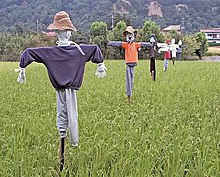Kuebiko
 From Wikipedia the free encyclopedia
From Wikipedia the free encyclopedia
| Kuebiko | |
|---|---|
God of wisdom | |
| Member of the Kami | |
 A grouping of Japanese scarecrows similar to Kuebiko | |
| Other names | Yamada no sohodo |
Kuebiko (久延毘古) is the Shinto kami ("god; deity") of folk wisdom, knowledge and agriculture, and is represented in Japanese mythology as a scarecrow who cannot walk but has comprehensive awareness.
Names[edit]
Kuebiko is the main name for this kami. There is also an alternate name of Yamada no sohodo (山田之曾富騰), mentioned in the Kojiki.
- Kuebiko comes from kueru (崩える), an archaic verb meaning "to break down; to become shabby and disordered", plus hiko (彦), an old epithet for "boy, young man", in turn from hi ko (日子), literally "sun child".[1][2][3] The meaning could be translated as something like "shabby young man".
- Yamada no sohodo is formed like an old-fashioned formal name, from surname or literal noun Yamada (山田, lit. 'mountain + paddy'), genitive or possessive particle no (の), and sohodo (案山子),[4] in turn from soho ("sopping wet") + -do, a contraction from -bito, the compounding form of hito (人).[5] The meaning of this name could be construed as "soaked person of the mountain paddies", a euphemism for "scarecrow".
Mythology[edit]
The (c. 712) Kojiki ("Record of Ancient Matters") has the earliest reference to Kuebiko in the myth of Ōkuninushi ("Great Land Master"). When Ōkuninushi was at Cape Miho in Izumo, a small kami arrived in a boat. Nobody knew his name, but a toad suggested asking Kuebiko, who revealed the god was a scion of the goddess Kami-musubi (神産巣日) named Sukuna-bikona (少彦名神). In Basil Hall Chamberlain's translation,
Then the toad spoke, saying: "As for this, the Crumbling Prince will surely know it." Thereupon [the Deity Master-of-the-Great-Land] summoned and asked the Crumbling-Prince, who replied, saying: "This is the Little-Prince-the-Renowned-Deity, the august child of the Deity-Producing-Wondrous-Deity." ... So [the Deity here] called the Crumbling Prince, who revealed the Little-Prince-the-Renowned-Deity, is what is now [called] the scarecrow in the mountain fields. This Deity, though his legs do not walk, is a Deity who knows everything in the Empire.[6]
Modern worship[edit]

In the present day, Kuebiko is worshipped as the god of agriculture or scholarship and wisdom. The Kuebiko Shrine (Kuebiko jinja 久延彦神社), which is a subordinate shrine (massha) of Ōmiwa Shrine in Sakurai, Nara, is dedicated to this deity.[citation needed]
See also[edit]
- Ting mong, a Cambodian scarecrow used against spirits and plagues
References[edit]
- ^ Nihon Kokugo Daijiten, entry for Kuebiko available online here Archived 2023-02-25 at the Wayback Machine (in Japanese)
- ^ Daijirin, second edition, 1995
- ^ Digital Daijisen, entry for Kuebiko available online here Archived 2023-02-25 at the Wayback Machine (in Japanese)
- ^ Nihon Kokugo Daijiten, entry for Yamada no sohodo available online here Archived 2023-02-25 at the Wayback Machine (in Japanese)
- ^ 1988, 日本国語大辞典(新装版) (Nihon Kokugo Daijiten, Revised Edition) (in Japanese), Tōkyō: Shogakukan
- ^ Chamberlain, Basil Hall, 1919, The Kojiki: Records of Ancient Matters Archived 2017-07-21 at the Wayback Machine, The Asiatic Society of Japan, p. 103.

